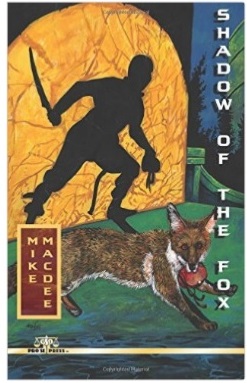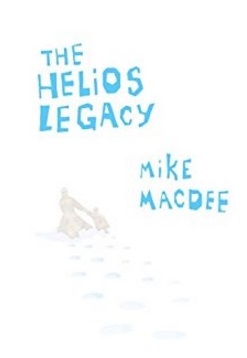
Although we talk a lot about indie publishing here on the blog, that’s not to say we shouldn’t discuss traditional publishing on occasion. Sometimes that will be by somebody who has had a happy Trad experience, sometimes not, but just like each author’s experience is unique, we all walk similar roads and probably should hear different sides of any situation.
Mike MacDee has graciously agreed to discuss his publishing experiences with us, and it’s worth a look.
.
Dan: Welcome aboard, Mike!
Mike MacDee: Hello, Dan! Hello, Internet!
You went different ways with different titles. Inquiring minds always want to know what that was like, especially writers who have yet to decide how they want to pursue publishing their works. What can you share about your roads traveled there?

I had two books in the works at once (actually more than that, but two that were ready for publication): Shadow of the Fox, and The Helios Legacy. Both were somewhat weird in concept, and I wasn’t sure if either were marketable. Shadow was the stranger of the two: a small anthology that mixed samurai fiction with 1960s Mission: Impossible.
Good god. My brain hurts trying to meld that together.
Yeah, not quite as strange as a musical version of Godzilla, but still pretty out there. At a glance, anyway.
Shadow is about as niche as it gets, and the more niche your project is, the harder it is to figure out how to market. I wasn’t even sure who to send it to, and debated going the self-publishing route, except that I would still have to figure out who the book was marketed to. I guess if you haven’t figured out what publisher or agent to send your work to, you probably haven’t figured out who your readers are, either.
Good point.
In the meantime, I started reading about the “New Pulp” movement: authors who were reviving dime novel genre fiction from the days of yore, back when Mickey Spillane was still churning out Mike Hammer books, westerns were still popular, and the Shadow was a household name.
I wasn’t aware that was a separate publishing route. That’s kinda cool.
It was news to me, too, probably because it’s a relatively new movement (I think). If your content isn’t literary enough for the normal publishers, you might consider looking into New Pulp instead.
How’d you pursue it?
 I contacted a blogger who I believe was also an editor, pitched him Shadow of the Fox, and asked him if he thought there was a market for it in the New Pulp movement. All I was requesting was advice, from one writer to another. I honestly didn’t expect to get an answer, because people rarely reply to my inane emails. Maybe they can smell crazy on me through the ‘net.
I contacted a blogger who I believe was also an editor, pitched him Shadow of the Fox, and asked him if he thought there was a market for it in the New Pulp movement. All I was requesting was advice, from one writer to another. I honestly didn’t expect to get an answer, because people rarely reply to my inane emails. Maybe they can smell crazy on me through the ‘net.
Hey, I replied to one of those…
Haha, yeah, you did. Maybe we’re BOTH crazy!
Well, this guy did reply. He told me Tommy Hancock over at Pro Se Press had just published a historical fiction anthology, and that he would ask Tommy on my behalf and get back to me later. Within 48 hours he emailed me back, and said that Tommy liked the idea and wanted me to send it to him. So I spent a week polishing the cover letter, the writing sample, and the manuscript before sending it to Tommy’s inbox. He threw a contract at me the next day. I was kind of excited.
Awesome! We really don’t hear enough stories like that. Then what happened? Flowers? Champagne? A sit-down with agents and editors in a smoke filled room where they handed you boatloads of cash?
Well, based on my experiences — and those of a friend of a friend who also got into new pulp publishing — things work a little differently in the pulp fiction world than they do in the regular fiction world. I’ll summarize the good and bad points of my experience with Pro Se, but keep in mind that this is just one green-ass author’s experience in the industry, during a somewhat rocky publishing year for Pro Se Press.
Fair enough. Have at it.
It’s my understanding that a traditional publisher builds an intimate relationship with its authors: they sit down and meet, have lunch, discuss the book at length. They get to know each other on a first name basis. And it takes about two years for the damn thing to actually come out, even after the proofreading, editing, and formatting is complete.
Two years might even be fast. According to some authors, glaciers move faster than their publisher.
I’m told the average is one to two years, so who knows. That’s one thing self-publishing definitely has over the traditional route: the book is ready when you say it’s ready.
Right. Which can be a bad thing, too. USE BETA READERS, PEOPLE! But, anyway; you say pulp fiction is kinda different?
 In the new pulp world, it’s a lot like it was back in the old pulp world: streamlining content is a huge factor, so there’s no time for the chummy approach. They’re not as intimate with their authors — at times they come off as borderline unapproachable — but that seems to be due to the sheer amount of stuff they publish in a single year, courtesy of many, many authors. There was no meeting with the editor or the production coordinator lady, and I rarely spoke to either via email except when they came up with new promotional ideas (which they shared via mass email), or when they were updating me on the book’s progress. They’re usually available to answer my questions, at least.
In the new pulp world, it’s a lot like it was back in the old pulp world: streamlining content is a huge factor, so there’s no time for the chummy approach. They’re not as intimate with their authors — at times they come off as borderline unapproachable — but that seems to be due to the sheer amount of stuff they publish in a single year, courtesy of many, many authors. There was no meeting with the editor or the production coordinator lady, and I rarely spoke to either via email except when they came up with new promotional ideas (which they shared via mass email), or when they were updating me on the book’s progress. They’re usually available to answer my questions, at least.
That sounds… tricky. I like to stay in the loop. But allegedly I’m a control freak.
It could be there wasn’t much to the loop to be in on. But I have a feeling the mass amounts of content pulp publishers churn out makes it hard to have a one-on-one sitdown with everybody, so they run it more like a factory.
However, the minimal communication may have caused some of the mishaps during my book’s publication, such as miscommunication about the publisher sending me copies for book signings (they send copies to retailers, but authors have to purchase themselves for signings, which threw my book signing plans slightly out of whack).
At least you have someone to blame. With my screw-ups in formatting my latest book, I can only yell at the mirror. And it’s yelling back, so…
Well, I made my mistakes, too, so I’m not totally innocent. But it’s hard to find resources that explain this part of the publishing process. There’s tons of articles that tell you the inside and out of submitting your work, or promoting the published book; that nebulous area in-between, the actual production process which takes several years to get through, rarely gets written about. Maybe because it’s different for everybody.
Pro Se does a lot of cool stuff as a publisher, though. They come up with fun ideas for helping their authors reach new markets, and they’ll accept all kinds of weird stuff as long as it’s creative and fun to read. If they hadn’t taken my book, I don’t think anyone would have seen its merit.
That’s big. It gives you validation that somebody sees your vision.
Either that, or the concept alone was enough to sell them on it. With communication at a minimum, it’s hard to tell who’s actually read your submission besides the freelance editor they hired to help you polish it. But I doubt the biggest name in New Pulp would approve a project without actually checking it out first. Tommy’s been around and seems to know what he’s doing.
So what kind of stuff did they do for you?
They hired a freelance editor for me who knew his stuff and had a lot of great suggestions that helped improve the book immensely. They published Shadow of the Fox in print and digital formats, and spread it around all the appropriate markets: Amazon, Smashwords, etc. I already had an author account on those sites, so my Pro Se book was right there waiting for me when I logged in — I didn’t have to take pains to add it myself.
“The best part is, I’m now under a publishing label, so maybe my future works will be taken a little more seriously.”
Oh yeah, and I didn’t need an agent for any of it!
Our agent friends won’t like to hear that. Look away, Bill!
But it still took three years to come out, even after all the editing and formatting was done, just like with other traditional publishers. And the sequel, which is now in production, won’t be out ’til 2018.
That can be frustrating.
Especially when you’re an over-productive maniac like me. Aheheh.
Now, the other book you did went a different route. Tell us about that.
Both of my books ended up published on the same markets. With Pro Se Press, everything was taken care of for me: hiring the editor, setting up the book’s cover, uploading the document, preparing the profile page, checking the proof copy.
When I self-published The Helios Legacy, I had to do it ALLLLLL myself. I paid the same editor out of pocket to give Helios a critique instead of a full edit job, which he gave me at half-price. I didn’t have the money for a professional to do a cover design, and honestly finding an impressive portfolio of book cover designs was a lackluster affair. They say you need a pro to design your book cover, and to an extent they’re right…but if you look at professional book covers, they all tend to look the same. Some of them I could’ve drawn myself in Microsoft Paint and saved $250+ in expenses. It’s all well and good if your cover/thumbnail glistens with pro polish, but it won’t make a difference if it looks exactly like every other cover on the shelf. A good cover jumps out at the potential buyer.
That’s true if you have an artist’s eye; many authors don’t. I don’t, for example. And you raise a valid point, you have to look at your cover by itself and then also look at it compared to other books it’ll be next to.
That’s why I initially tried to hire comic artists with striking art styles. But as usual, they all turned me down.
“I always seem to ask someone for help right when their midlife crisis begins.”
So I took a chance and used my background as a comic artist to design my own cover. I mean, what the hell, I did the conceptual design for Shadow of the Fox’s cover, which was done by a professional, whom I also didn’t have to pay thanks to Pro Se.
I went with a minimalist approach partly because it suited the bleakness of the book’s dystopian setting, and also to avoid having to own up to my shortcomings as an artist. I don’t recommend this approach if you’re not also a trained artist (I’m also not claiming to be a great artist, but I generally know what I’m doing…most of the time). Adding a new book to Amazon, Smashwords, and/or Lulu is no picnic, either — at the moment I still have to wait a month for Helios to be available on Amazon via Lulu, and Amazon had an issue with my banking info that may or may not have been resolved — but eventually I figured it out.
Finding reliable freelancers is tough on your own, which is another benefit to using a traditional publisher. Once the publisher’s freelancers work with you, you might form new contacts, which isn’t easy this day and age when everyone flakes out and doesn’t return your calls or emails. Or maybe it’s just me, and nobody else has that problem. Oh, Charlie Brown.
In either case, whether you’re pro published or self-published, the marketing is entirely up to you, and it all comes out of your pocket.
I think a lot of authors don’t know that. They figure they got signed, they can just write, and it doesn’t work that way.
It totally doesn’t. You can even find vlogs talking about this very subject. Publishers have the means to promote all their authors, but they never use them; if they ever do, it’s rare. Pro Se Press listed Shadow of the Fox on their sister sites with some nice little announcements (which erroneously called the protagonist Mata the Ninja instead of Mata the Fox, so now all their sister sites call him that, too….ugh…) and listed it in their catalog.
Oops.
And that was mostly it. That’s the most you can expect from your publisher:
…the rest is YOUR job. Book signings, giveaways, and anything else you can come up with…
to help promote the book and spread awareness. And again, it all comes out of your own pocket, and it won’t be cheap.
But like I said, sometimes Pro Se Press comes up with cool ideas that help out. Most of which I can’t talk about because they’re still in the works. Aheheh.
What would you recommend for newbies?
I think it’s a good idea for authors to take a stab at both publication methods and find out which one suits them better.
I agree. And some titles will lend themselves to Indie while other titles are more geared for Trad. Do you have a preference now?
I’m more likely to self-publish because I’m over-productive, because everything I write is weird and niche and gets turned down by traditional publishers, and because I don’t want to wait two or three years for every book to come out.
THAT is the main reason I indie publish (and encourage others to).
A publisher only has so much room in its yearly schedule, but the self-publisher can turn out books year-round, if they’re diligent in their proofreading and editing, and if they can find the right contacts and afford all the expenses before, during, and after the publishing process (most of which a publisher will take off your hands to make your life less hellish).
Yeah, but there are tradeoffs either way. I know running your own show isn’t for everyone.
Yes. Self-published I’m my own boss and I get anywhere from 30% to 100% of the royalties depending how I go about it. Traditionally, you’re lucky if you get 15% of the royalties. And some publishers will change your book, either with or without your consent. Dashiell Hammett’s publisher made him call one of his novels “The Glass Key” before they even knew what the book was going to be about, and he had to stick with it. It had nothing to do with the plot at all. Pro Se didn’t editorialize Shadow of the Fox: nobody stepped in and made changes without my permission.
Also, if you’re given an advance like most trad. publishers do, you’re expected to pay it back in book sales, which is ALSO not really common knowledge to new writers.
WritersDigest explains in an article “How Book Advances Work”. Basically, whatever you’re paid in the advance, you have to earn back in sales before you get any further royalties. It’s not a free paycheck. Well, it is if the book fails to sell, so if your advance was millions of dollars, then to hell with it. Pro Se Press doesn’t offer advances: on the down side, I don’t get lots of money up front, but on the plus side, any royalties earned go straight to me.
In a nutshell, if you thrive on independence and want total control over your production and release schedule, self-publishing is the way to go.
I agree.
If you don’t have a clue where to start, or you can’t afford to pay the expenses, send it to the right publisher and get your foot in the door.
I pretty much agree there, too.
Financially it doesn’t make much difference, ‘cos either way you’ll likely invest more money in the book than you’ll ever make off of it.
Wait, there were no boatloads of cash???
Basically, don’t quit your day job…and don’t be delusional enough to think you won’t NEED a day job. Not that I’m speaking from experience there. Cough cough.
Hey, ya gotta walk before you can run. Few authors can retire from one book, so realize it’s a business and it’s a time consuming one, but just as editing is part of writing, so is marketing. Everyone’s experience will be different but if you love the game you gotta role up those sleeves and dive in.
Marketing the book can be fun, too, if you’re creative about it. It doesn’t have to be a social media slog,
and they say social media isn’t the best method to market anyway. I’m using music and video game projects as promotional tools (in addition to Goodreads and Amazon giveaways), and I have a book signing at the Japanese Friendship Garden slated for October. It beats grinding away hours of my life in front of a word processor.
.
Thanks to Mike for sharing his experiences! Feel free to comment below about yours, or to ask questions.

Check out Mike’s books:
Shadow Of The Fox
The Helios Legacy
You can find Mike at:
Website: https://mikestoybox.net/
14 replies on “Balancing Act: Mike MacDee’s Adventures In Publishing”
interesting read! I’m in the process of finding a publisher for my autobiography but I keep getting rejected. I do not know what else to do no one is interested. Is self-publishing a good idea? i feel like it is not as legitimate.
LikeLiked by 1 person
I’m sure your autobiography is legitimate.
LikeLike
I meant is self publishing as legitimate as traditional publishing? Could I see the book in bookstores if i do self publishing?
LikeLike
I knew what you meant. And yes, you could. Bookstores want to make money selling books people want to read. If there’s a market, bookstores will be inclined to carry it – depending on a lot of factors, as you might guess. Finding or creating the demand is always the trick.
LikeLike
There IS a bit of a stigma with self-publishing still, unfortunately, because of the lack of quality control. If even an idiot can do it, plenty of idiots will do it. But traditional publishing is rife with bad books, too, *coughfiftyshadescough* so they’re hardly the ones to be passing judgement.
At the end of the day, your readers could care less about your publishing label: they only really care if the book is any good. I dunno about getting a self-published book on bookshelves, but if you make it available as an ebook it’s easy and convenient for everyone to get their virtual hands on it.
LikeLiked by 2 people
The biggest thing traditional publishing houses have going for them is a reputation for quality. However, that’s kind of like saying the movie industry has a reputation for quality. They trumpet from the rooftops of their successes and they bury their failures quickly. The actual ratio of good books to bad is about 10 to 1. 10 bad, that is. Most books do not review do not earn back their advance which means they didn’t sell enough copies. Which means the people who decided that was the book to launch, they made a mistake. So if you are making mistakes 90% of the time, you better shout from the rooftops of your successes or people are going to figure out you don’t know what you’re doing. The fact is, authors figured out these publishers don’t know what they’re doing and that there are plenty of niche markets to go to find customers who want to read what we can provide them
You don’t get 50 or 100 or 500 reviews from your friends. Amazon is good enough to sniff that out and who has 50 friends who would write reviews anyway? Nobody.
You get 30 and 50 and 500 reviews from writing a quality book and working your butt off to market it.
LikeLike
Reblogged this on Don Massenzio's Blog.
LikeLiked by 1 person
Thanks for sharing these experiences. This pretty much validates what I went through. Waiting nine months to get a rejection from a traditional publisher is just a waste of time, especially when they don’t even give you a hint about why the book was rejected.
LikeLiked by 1 person
Ugh. That sucks.
It’s like those commercials for the insurance company where they say you bought the wrong insurance and the person says no I went with the wrong insurance company. The people who make you wait nine months to say we’re not interested have no idea about customer service or the speed of the Internet or crowdsourcing. It’s just an antiquated model, and since it produces more failures than successes, that should be obvious to them. But since they are in the power position and making money, they won’t change. As soon as they change, they’ll make a ton more money!
LikeLiked by 1 person
The traditional houses could make a bundle by funding a small staff of editors/readers to troll the Indie market and scoop up the best of the best. Where else are they going to find the stars of the future? First to do that wins the race.
LikeLiked by 1 person
Yep. But what they’ll do is just buy somebody who does/ is doing that. Creativity is not their strong suit
LikeLiked by 1 person
That sounds like me every time I submitted to publishers other than Pro Se. I physically reeled from shock when they said “sure, we’ll take it! are you kidding? eat this contract!”
LikeLiked by 2 people
[…] etc. We can ask and have asked others periodically through social media who they used and liked. A recent guest post on my blog was about a very small publishing firm and the guest was very happy with them. Other […]
LikeLike
[…] prior guest blog post about the travails of traditional publishing, was insightful. I’m sure you’ll agree this one is, […]
LikeLiked by 1 person